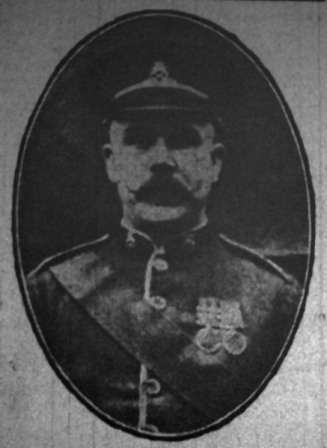
COLLYER, JOHN LATIMER ("Jack")

Photograph with kind permission from the Uttoxeter Advertiser
|
|
Source |
||||
|
CWGC |
SDGW |
Uttoxeter Advertiser |
Other |
||
|
Parents |
John and Charlotte Collyer |
Yes |
Not in the database |
|
5d, 5e |
|
Where born |
Stansley Wood |
|
1c |
|
|
|
Lichfield, Staffordshire |
|
|
5d, 5e |
||
|
When born |
About 1869 |
|
|
5d, 5e |
|
|
About 1870 |
|
|
6 |
||
|
Address |
Territorials’ HQ in High Street, Uttoxeter |
|
1c |
|
|
|
Wife after he died: Planton Cottage, Coreley, Ludlow, Salop |
Yes |
|
|
||
|
Spouse |
Sarah Collyer |
Yes |
1b |
|
|
|
Yes |
|
1b, 1c, 1d, 1e, 1f |
|
||
|
Children |
3; eldest under five years old and the youngest a baby only a few weeks old. |
|
1c, 1e |
|
|
|
More than one, at lease one being a son |
|
1c |
|
||
|
More than 1 |
|
1d |
|
||
|
Employment Before Joining up |
Regular Army for many years, followed by a position in the painting department of the Leighton Ironworks |
|
1c |
|
|
|
Military service before the war |
Regular Army for many years: · Joined the 2nd V.B. Lincolnshire Regiment in November 1888 and after 3 years' service was transferred to the 2nd V.B North Staffordshire Regiment, with which he served for nine years. · During this time he became Colour-Serjeant of I Company (Uttoxeter) · He later held a similar position in connection with the Lichfield and Uttoxeter Company of the 6th North Staffordshire Regiment |
|
1c |
7a |
|
|
Where enlisted |
|
|
|
|
|
|
Regiment |
North Staffordshire Regiment - |
Yes |
1c, 1d |
2 |
|
|
Unit |
6th Bn. |
Yes |
1c, 1d |
2 |
|
|
6th (T.F.) Bn. |
|
|
2 |
||
|
Rank |
Colour Serjeant |
Yes |
1d |
9 |
|
|
Sergeant Major |
|
1d, 1e |
|
||
|
C.S.M. |
|
|
2 |
||
|
Service Number |
522 |
Yes |
|
|
|
|
Date of Death |
20 May 1917 |
Yes |
1b, 1c, 1d, 1g |
2 |
|
|
Age at time of death |
47 |
Yes |
1c, 1g |
|
|
|
Where Killed or died |
At home in Uttoxeter |
|
1b, 1c |
2 |
|
|
How he died |
Heart attack |
|
|
2 |
|
|
Heart condition and overwork |
|
1b, 1c |
|
||
|
Location of Grave or Memorial |
Uttoxeter Cemetery - Grave New. I. 919. |
Yes |
|
|
|
|
Uttoxeter Town War Memorial (Market Place) |
|
|
|
2, 4 |
|
|
Awards |
Volunteer Long Service Medal |
Yes |
1c |
|
|
His parents were John and Charlotte Collyer, of UttoxeterCWGC; and his wife was of Sarah Collyer, of Planton Cottage, Coreley, Ludlow, Salop.
He was born at Stansley Wood at the time when his father was clerk of the works to the Blithfield Estate1c.
The 1871 Census return for St. Mary’s Church Parish, Uttoxeter5d, shows that he was living with his parents and brother, William, in Uttoxeter:
John was about 2 years old at this time.
The 1881 Census return for Abbots Bromley Civil Parish, Staffordshire5e shows that he was still living with his parents and the household now included his father’s step-mother (i.e. John grandmother).
John Junior was now about 12.
He joined the 2nd V.B. Lincolnshire Regiment in November 1888 and after 3 years' service was transferred to the 2nd V.B North Staffordshire Regiment, with which he served for nine years, during which time he became Colour-Serjeant of I Company (Uttoxeter) 1c. He later held a similar position in connection with the Lichfield and Uttoxeter Company of the 6th North Staffordshire Regiment1c.
He held the long-service medal, which was presented to him by Mr. John Bamford, J.P. on 22nd May 19091c.The 1901 Census return for Uttoxeter Civil Parish5g, shows that he was no longer living with his parents, who now had a 16-year-old servant. Presumably he was serving abroad with the army?
John Collyer’s obituary in the Uttoxeter Advertiser said that when the old volunteer movement was started in Uttoxeter, 'Jack' Collyer was one of its first adherents1e and 'his infectious enthusiasm attracted others to follow his patriotic example'1c.
When the Territorial Scheme came into operation, he gave the movement all the support he could, and when the Volunteer Training Corps was officially recognised he was appointed Sergeant-Major of No. 4 Company, 2nd battalion, Staffordshire Regiment, which included men from Uttoxeter and the villages of Rocester, Denstone, Ellastone, Stanton, Swinscoe and Hollington1c. His obituary1c said that he filled that position in a manner befitting the keen soldier that he was.
He had seen active service throughout the South African (Boer War) campaign and possessed the South African medal1c, 1e, so when the local company was mobilised on the 6th of August 1914 he marched out of the town with the other men1a, 1c, 1e, 2. However, after several months' training he failed to pass the medical test and he was discharged1e. This 'caused him the keenest regret'.
As an example of his unassuming character, his obituary in the Uttoxeter Advertiser1c related the tale of when he was returning from the South African Campaign. Some of his friends had arranged a welcome home, but he heard about it and so, to keep from being observed, he got off the train at Marchington and walked to Uttoxeter instead of coming straight to Uttoxeter station.
He also had a remarkable knowledge of musketry and was one of the local Territorials chosen in 1904 to undergo a course of instruction at the Hythe School of Musketry1c. He was thoroughly acquainted with every pattern of Army rifle introduced over the 30 years preceding his death and was at one time noted as one of the best marksmen throughout a wide area. His prowess with a rifle won him many trophies1c.
Before the war he was employed for many years in the painting department of the Leighton Ironworks, Uttoxeter1c He was highly respected by his employers and fellow workmen for his upright character and integrity1c,
| These buildings, part of the original Leighton Ironworks in Uttoxeter, will have been a familiar sight for Jack Collyer |
|
He was a member of the Committee of the Sailors' and Soldiers' Families Association and was also a member of the Workers' Union1c. Prior to his death he had also been freely mentioned as a prospective candidate for a seat on the local Urban Council1c.
During the war he was the recruiting sergeant for the local Territorial Battalion. The Attestation Form for William Brough9, who would later die at the front, gives us a sample of his signature:
 |
His obituary in the Uttoxeter Advertiser1c said that although his health prevented him from taking an active part in the war, he 'threw himself heart and soul' into the Voluntary Territorial Company's movement and 'the local company were distinctly fortunate in having the staunch services of a man of his ripe military experience and innate real enthusiasm'. He was so keen that he regularly walked to Burton from Uttoxeter to attend drill.
In May 1915 the Staffordshire Weekly Sentinel7 published a photograph of the Uttoxeter Volunteer Training Corps.
|
Jack and his family lived at the Headquarters for the Territorials and Volunteers in the High Street, Uttoxeter. |
|
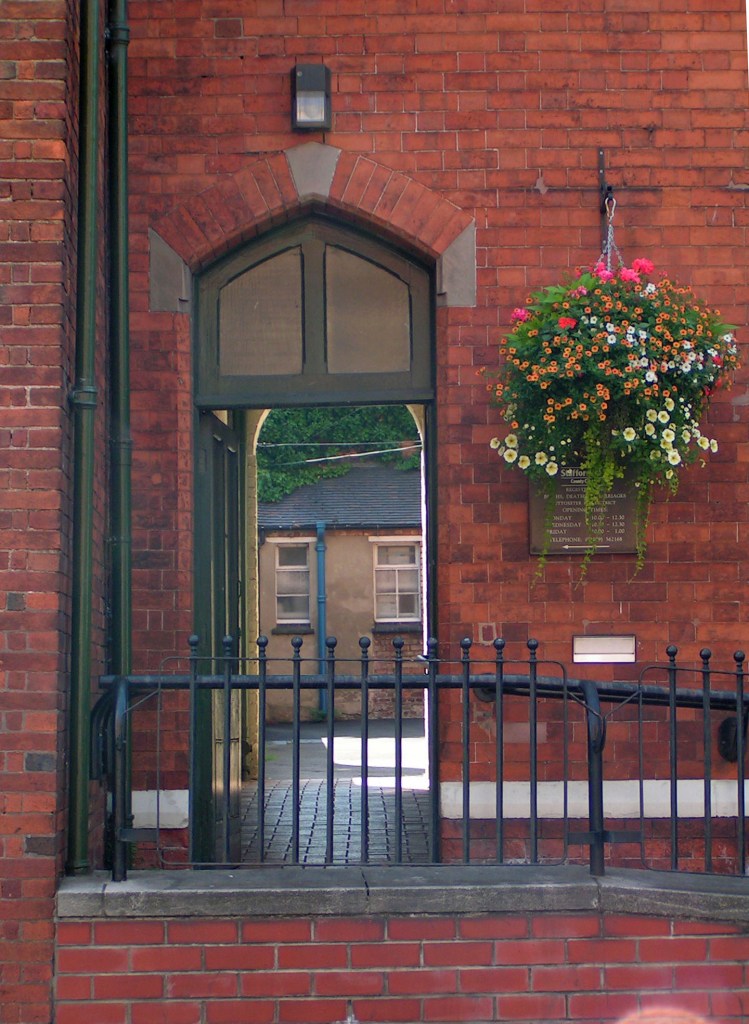 |
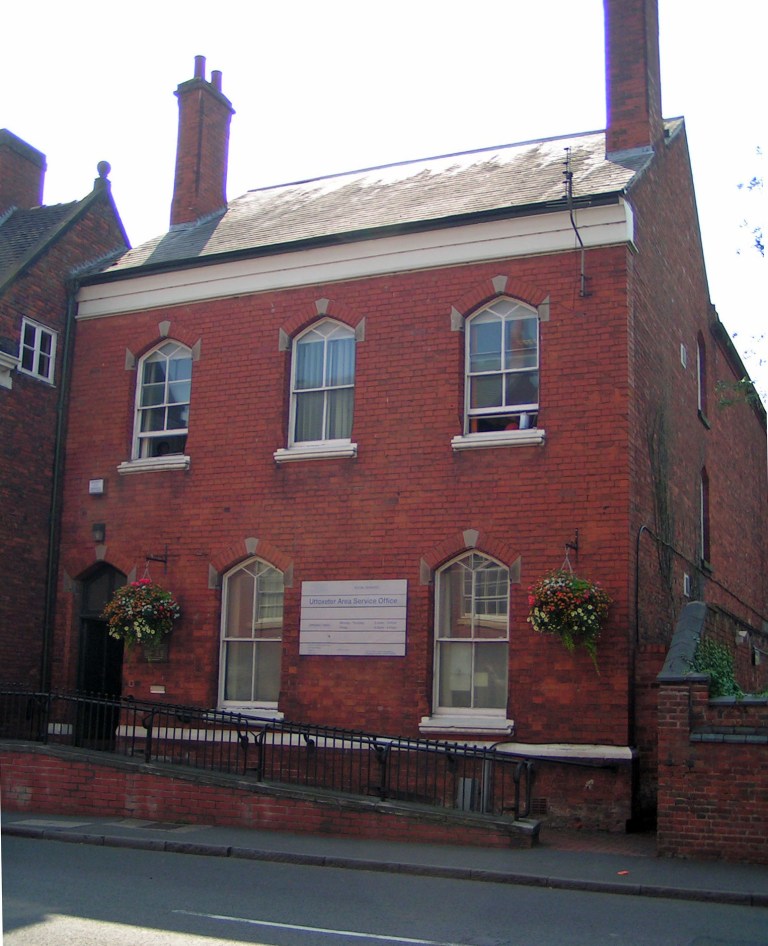 |
He had been busy with a number of duties in the drill hall one Saturday and had gone to bed, when he was awoken when one of his children called out. His wife had been ill during the preceding weeks1b, so he arose to attend to his son. As soon as he had risen he began vomiting violently, and this put a strain on his heart1c. Unfortunately he died in a chair at a side entrance to his home during the small hours of the Sunday1b.
His obituary says that few of his friends realised how ill he had been with a long-term heart condition because he showed such grim tenacity in all aspects of his life1c. The Uttoxeter Advertiser published an obituary1c, in which it was said that with the grim tenacity that was one of his most prominent characteristics, he continued his daily duties often when he was physically unfit. He was about as usual on the day before he died, busying himself with many duties at the Drill Hall1c.
At his inquest1a, which was reported in detail in the Uttoxeter Advertiser1a,, details of the events leading up to his death were given. This inquest must have been an ordeal for Mrs. Collyer:
During the evening of his death he had had a bath and complained afterwards of feeling cold. His wife explained to the inquest that he always fell ill after having a bath.
He then had supper at about 9 o’clock. After eating some tinned salmon, cocoa and bread and butter he retired to bed at about 10 o’clock. Two hours later he was taken ill with violent vomiting, and he died soon afterwards.
According to his wife she had known for a while that he had had a weak heart. In addition to his ordinary duties he was also responsible for caring for the Drill Hall and was very hard worked. She said that he had complained of his heart and was often short of breath.
Dr. T. Bamford, his doctor, said that he had received an urgent message at 1 o’clock in the morning saying that John Collyer had died. He went immediately and found him dead in a chair in the doorway of his house. When he had asked what had happened Mrs. Collyer had told him that John had partaken of some tinned salmon for supper and had been violently sick afterwards. Dr. Bamford asked for the tin that the salmon had come in and noticed that it smelled very offensive.
Dr. Bamford also added that he had known John Collyer for many years and had attended hm since his discharge from the army. He suffered from shortness of breath and had recently lost a lot of weight. Dr. Bamford said that he was satisfied that John Collyer’s death had been due to excessive strain being placed upon his heard brought about by violent vomiting.
The Coroner asked if he thought that the salmon had had anything to do with his death and he replied that he thought that the salmon was not fit to eat on the Sunday, when John Collyer ate it, but must have been alright on the Saturday, when the children had some. He felt that if the salmon had been in the condition suggested when he examined the tin, John could not have possibly eaten it.
In summing up, the Coroner said that it was for the jury to decide whether the deceased had died from eating the salmon or from natural causes. Dr. Bamford had said that he was satisfied that the latter was the case, and although the salmon may have caused the vomiting, he did not attribute his death to that. There was no suggestion that the seller of the salmon had sold an article that was unfit for human food, because the fact that the salmon was fit to eat on Saturday and not by Sunday was no doubt due to the fact that tinned articles did not keep as long as fresh food. He also said that salmon was currently much resorted to as a result of the bread shortages, and it would be a disaster if from a little incident like this people stopped buying salmon.
The jury returned a verdict in accordance with the medical evidence.
His obituary in the Uttoxeter Advertiser1c said that he was an exceptionally good instructor and it was felt that his position was going to be most difficult to fill. The obituary also said that he possessed the happy knack of imparting his knowledge to others in simple, homely language, and was at all times patient and persevering He was always even-tempered, courteous and genial, and it was said that his popularity was unbounde. The affection that the officers and men had for him was given tangible form on several occasions.
He left a widow and three children, the eldest only five years old and the youngest, a baby, only a few weeks old.
He was laid to rest in Uttoxeter Cemetery with full military honours and the Uttoxeter Advertiser published an account of his funeral1d. In this account it was said that the universal respect and esteem in which he was held was evidenced by a large number of people who assembled along the route of his funeral cortege and at the graveside to pay their respects.
A touching scene was witnessed as the cortege passed down the Hockley, where a number of employees of Messrs. Bamfords temporarily left their workshops and lined the road1d. Blinds were drawn at most of the residences along the route1d.
| The Hockley in Uttoxeter, where this touching scene took place. The Bamfords workshops are in the vicinity of the church spire in the distance on the left of this picture. |
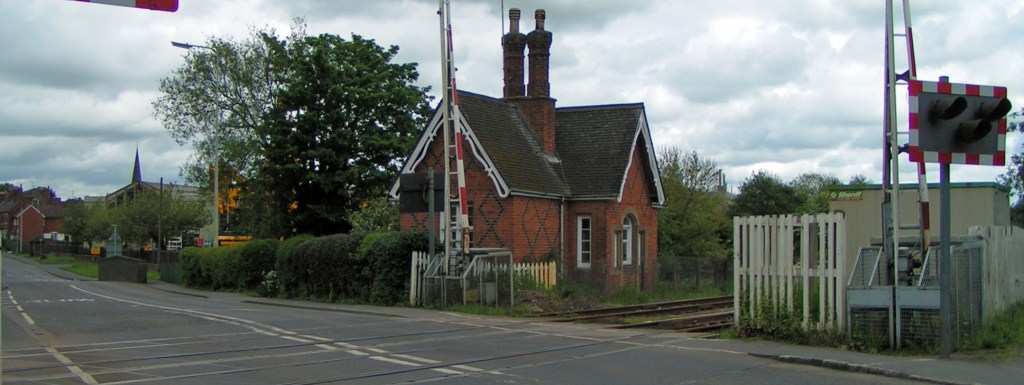 |
As John Collyer had been a member of Special Constabulary, the funeral cortege was headed by the police and special constables. Then came his fellow workmen from Messrs. Bamfords, followed by soldiers who were home on leave and members of the local Territorials who had been discharged from the army1d. Next came a firing party, composed of twelve members of the Uttoxeter Volunteer Force, followed by the remainder of the corps1d.
The coffin was covered with the Union Jack and bore John Latimer’s cap and bayonet, ‘silent reminders of his splendid military activities’1d.
After the benediction at the graveside, the firing party lining either side of the grave fired three volleys, and then the “Last Post” was sounded1d.
|
|
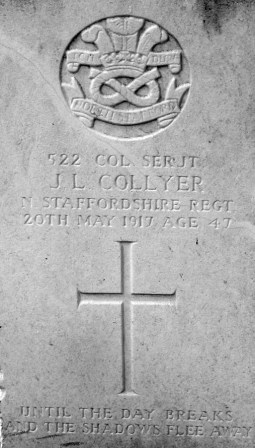 |
|
John Collier's gravestone in Uttoxeter Cemetery. The inscription at the base reads “Until the day breaks and the shadows flee away”. |
|
I
In June, a month after his death, a meeting was held in the Town Hall to consider ways and means of making some tangible acknowledgement of the good work performed over a number of years by the late Sergeant Major J.L. Collyer. The Uttoxeter Advertiser reported the proceedings1e:
It was stated that he had been a man of sterling character who, for thirty years of his life, gave unstinting service to his country and the town of his adoption.
It was also pointed out that in the building up of the old Volunteers, it was an undoubted fact that his enthusiasm in his voluntary work ‘helped perhaps more than anything else towards the efficiency of the Company; and we now realise how much we owe to his training of the Territorials who marched out of the town in August 1914, and have since fought so gloriously’. Sergeant Major Collyer was with the men on that occasion, although he was long past military age, and he stood his share of the rigours of camp training for several months, but much to his own regret and that of the whole battalion he was subsequently discharged for medical reasons.
After his discharge he remained ‘heart and soul with the military, and his valuable services were freely offered and gladly accepted by the present Volunteer Force, every man of which re-echoes the sentiments always expressed by the late Sergeant Major as an instructor and his splendid qualities as a comrade’.
Within a few minutes of the close of the meeting, subscriptions of half a sovereign each had been received from three people, Messrs. Bamfords Ltd. donated two guineas and two other individuals donated a guinea.
The Uttoxeter Advertiser closed the article by saying that they would be pleased to acknowledge any further sums that may be handed to them or any member of the committee. The late sergeant Major Collyer was universally respected, and the utmost sympathy was expressed with his wido and three young children.
This article was followed a short while later by a notice, also in the Uttoxeter Advertiser, inviting further subscriptions1f.
|
This notice was posted in the Uttoxeter Advertiser in May 19181g to mark the first anniversary of his death |
In Loving Memory of my Dear Husband, John Latimer Collyer, who fell asleep at Uttoxeter on May 20, 1917, aged 47. – A faithful and affectionate husband, father and friend. |